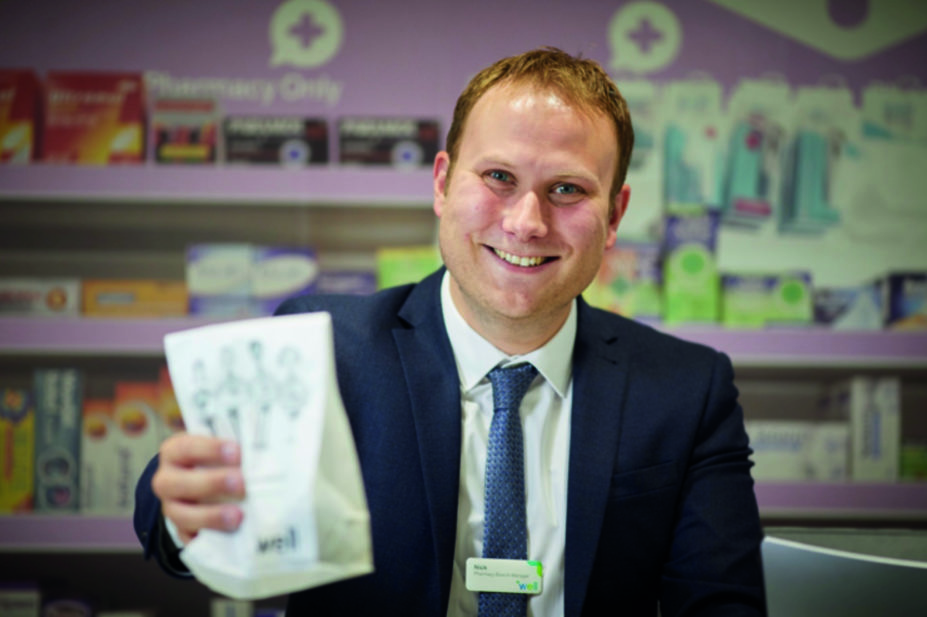
Courtesy Nick Thayer
Nick Thayer is pharmacy services lead for Well, the largest independent pharmacy business in the UK.
Why did you decide to become a pharmacist?
I’ve always loved chemistry and wanted a practical application that suited my interest in healthcare. I chose to be a pharmacist because there are so many different applications and opportunities. I suffer from an eternal curiosity and desire to dive into new things, and the prospects offered by a pharmacy degree seemed irresistible.
How did your early years of practice guide your career?
I wanted real patient contact and the relationships I built in community pharmacy were one of the key aspects that made the job special for me. I started my pre-registration year with Well in 2010 and have progressed within the company. I qualified as a pharmacy manager in 2011, and have worked in a variety of locations, including small pharmacies and larger healthcare centres in Cheshire. A small team at the heart of a bustling community, providing that ‘first port of call’ care, is the essence of community pharmacy. The first pharmacy I managed, in Wistaston near Crewe, Cheshire, was very isolated, so as one of the most accessible healthcare professionals, I dealt with a wide range of conditions, from suspected heart attacks to infected toes.
What does a typical day as a community pharmacy lead look like?
I am the pharmacy services lead for Well, which involves responsibility for both the NHS and private service offerings in our pharmacies (e.g. NHS minor ailments, private malaria treatment and meningitis vaccinations). I’ve always been vocal about the value and importance of local services, particularly at the local pharmaceutical committee (LPC) level, and this set me in good stead when an opportunity came up in the superintendent’s team. I undertook activities as part of the Pharmaceutical Services Negotiating Committee leadership academy and became vice-chair of Community Pharmacy Cheshire and Wirral LPC.
It’s important not to wait for opportunities but to actively look for something new to get involved in
It’s important not to wait for opportunities to come to you but to actively look for something new to get involved in. All experience is valuable, even if its immediate value to your current role isn’t apparent.
I lead a team, which includes two service co-ordinators, that identifies and processes contracts for local services (e.g. sexual health, minor ailments, emergency supply, medicines optimisation and health checks) across the UK. With several commissioners this can be quite complex, but we work collaboratively to ensure our pharmacy teams have everything they need to provide a high-quality service. My team are the experts who can help form a bridge between the pharmacies and commissioners. I examine data and look at trends in services in order to provide insight to guide the business, matching the focus of the NHS, while identifying and developing new opportunities for our pharmacies.
Currently, I’m spending much of my time managing the flu jab service. This involves working with internal and external stakeholders to bring everything together to allow pharmacists to provide this important and potentially life-saving service. I also advise pharmacists on technical and clinical queries they may have when the service goes live.
In my view, pharmacy services are the future of the profession and I’m very excited to be part of that transformation.
How do you help pharmacies meet and deliver high standards of service?
The pharmacy sector is under increasing pressure and it’s vital that services aren’t seen as a chore or difficult to provide. A large part of my job is to make service delivery as easy as possible for our teams. Sometimes this means changing our processes, which may influence commissioners to change their way of working. Continued professional development (CPD) is also key to quality service delivery, so I highlight relevant opportunities to our pharmacies and share best practice to ensure our teams have the required knowledge and scope to develop.
What does your private service offering involve?
Our private service offering is tailored to each pharmacy and we currently offer many private services, including vaccinations, travel health and weight loss support.
Different patients have different needs, and we match our service offering to the needs of our local communities
Different patients and teams have different needs, and we match our service offering to the needs of our local communities. As the healthcare landscape changes, customer expectations are becoming increasingly complex and demanding and there is a huge opportunity to expand our private service offering. My role is pivotal to its development.
How do you develop new opportunities for your pharmacies?
We actively engage all our pharmacy teams in improving the organisation and the services we offer. We encourage communication between our team and pharmacy teams, and they are encouraged to explore new ideas on how they can better support their local patients and to highlight any potential opportunities to us. One of the greatest complications and benefits of local commissioning is that it has to meet the needs of local people. This means that one service or process can’t fit all and we must be adaptable to different settings. Local organisations, such as LPCs in England, are champions of this and we always try to work with them to support new opportunities. We also have the advantage of pharmacies across the UK, so we can trial new things in very different environments to see how to make them fit best in their locality.
What is the most challenging part of your role?
It’s not new news that community pharmacy is under a huge amount of pressure and that the NHS is facing challenges over funding and workload. Part of my role is to successfully communicate the true value of community pharmacy to ensure that it remains a priority. It’s important to me that commissioners understand the value of supporting and funding pharmacy services, but this doesn’t always happen.
My vision is for every pharmacy to provide every service so that all patients have the best possible care
It can be very frustrating when a service or pilot scheme ends due to a lack of funding when it’s making a real difference. My job is to work with people who may not fully understand the benefits pharmacy can add to patient care and convince them that a community pharmacy service is the best thing for our patients and to support NHS goals. My vision is for every pharmacy to provide every service so that all patients have the best possible care, and I will continue to work within my power to make this possible.
What is the best piece of advice you have received during your career?
Be confident in your own abilities: if you aren’t, no one else will be. That, of course, is much easier said than done.


